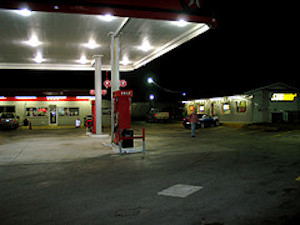
In state elections, voters decline to punish pols for raising transportation taxes

UPDATED: July 14, 2014
Raising the gas tax is a political death sentence, right? Well, not necessarily. In at least two states where legislators raised gas taxes or other fees in the last two years, voters have responded by sending almost all of the supportive members of both parties back to their state houses. Could it be that voters are more supportive of raising revenue than we think?
States are finding it more and more difficult to find funding for transportation and other infrastructure. The 2012 MAP-21 law kept federal funding essentially flat, even as the lingering effects of the long recession have left states in desperate need of infrastructure repair and renovation. Meanwhile, gas taxes are not yielding what they once did, thanks to rising construction costs, growing fuel efficiency and a drop in miles driven per person. With no other solution in sight, some states have concluded they have little choice but to increase gas taxes to maintain and build a 21st century transportation system.
In the last two years, at least seven states have done the “unthinkable” and either increased their gas tax or otherwise changed their revenue model to raise transportation funding: Maryland, Massachusetts, Wyoming, Vermont, New Hampshire, Pennsylvania and Virginia. (For a complete run-down of state revenue moves, see our tracker here.)
With expected insolvency of the Highway Trust Fund occurring as soon as next month, its important that Members of Congress take a scan of what is happening in their states and districts. Of the seven states that raised taxes for transportation, Pennsylvania and Virginia have had primary or general elections since passing those bills. We took a look at how legislators who voted in favor fared in those contests to see if the mantra that gas tax votes lead to an early end to political careers is true.
In 2012, before the legislation passed, Pennsylvania was faced with transportation cuts creating worries of an increase of structurally deficient bridges under weight restrictions, road mileage rated in “poor” condition, and a decrease in transit service throughout the Keystone State. At the time, it led the nation in the number of structurally deficient bridges with 4,700.
Pennsylvania’s changes to fuel-related taxes and fees gave the Department of Transportation $2.3 billion to repair and maintain the state’s roads, bridges and mass transit system. The revenue package amounted to a 40 percent increase in the department’s budget, and created an annual $20 million statewide multimodal competitive transportation fund accessible to local governments and businesses. The measure passed 113-85 in the House and 43-7 in the Senate.
Of the 156 aye votes, 90 of the favorable votes were Republicans and 66 were Democrats. Thirty-two of the members that voted “yes” were not on the ballot for reasons such as retirement, seeking different elected office or term not yet expiring, leaving 124 “yes” vote members on the primary ballot on May 20, 2014. Of the members on the ballot, just 5 lost their primary, meaning that 96 percent of those who voted for the transportation revenue won their election. Just one Republican lost his primary Republican Representative Michael Fleck (R-Huntingdon) — but he won the Democratic primary through a write-in campaign. Fleck will be on the November general election ballot, but doesn’t have plans to switch parties. Four House Democrats did lose their seats: Leanna Washington (D-Montgomery) and J.P Miranda (D-Philadelphia), who were both indicted for misusing campaign funds; Erin Molchany (D-Alleghany County) who was re-districted and lost her seat to a Democrat who had voted No on the legislation; and James Clay (D-Philadelphia).
“Pennsylvania legislators showed political courage in voting for the transportation revenue package in 2013 to guarantee the state’s economy and overall mobility of the population would continue to prosper,” said Pennsylvania’s Secretary of Department of Transportation, Barry Schoch. “In return, Pennsylvania’s voters supported those that stepped up to the plate and took this crucial vote by supporting them in our primary election.”
In Virginia, legislators last year replaced the state’s 17.5 cents-per-gallon tax on gasoline — which had not been changed since 1987 — with a new 3.5 percent wholesale tax on gasoline (6 percent on diesel) that will keep pace with economic growth and inflation. It also raised the state’s general sales tax and gave the increment to transportation, and created a regional funding mechanism that boosted the sales tax to six percent in Northern Virginia and Hampton Roads and required those funds to be spent only on transportation projects in those areas. The measure passed 64-35 in the House and 26-12 in the Senate.
The commonwealth’s 100 House Delegates were on last November’s general election ballot, while the 40 Senate seats, whose elections are not staggered, will have their election next fall. Of the 64 House Delegates that voted for the transportation revenue package, 31 were Republicans and 33 were Democrats. Five of the “yes” vote members weren’t on last fall’s ballot due to retirement or seeking different elected office. No Democrats lost their seats and just four Republicans were on the losing end in their elections, including: Joe T. May (R-Clarke), Mark Dudenhefer (R-Prince William), Beverly Sherwood (R-Frederick), and Michael Watson (R-James City). Of the 183 elected officials who showed the courage to support necessary infrastructure in Virginia and Pennsylvania, just 9 lost their general or primary elections representing less than 5 percent of those who voted “yes” in these states.
As Wyoming, Massachusetts, Maryland, Vermont, and New Hampshire have their primaries throughout the summer, we will be keeping tabs and will let you know if this trend holds true. But to this point, all indications are that a Congress facing a deadline to salvage our nation’s transportation program can safely follow state legislators’ lead on transportation revenue. In return, they are more likely to earn gratitude than ire from constituents eager to ensure a sound transportation infrastructure.



